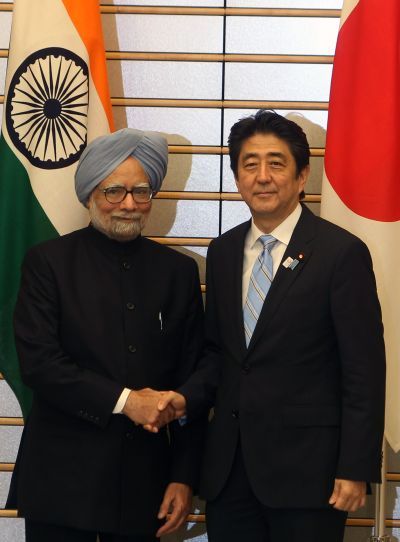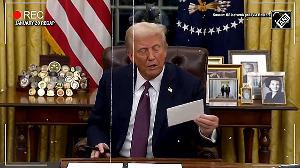 Japan has the capital and needs to pull out of China, which has been its major destination. India, on the other hand, desperately needs capital especially for infrastructure, argues Rajeev Srinivasan.
Japan has the capital and needs to pull out of China, which has been its major destination. India, on the other hand, desperately needs capital especially for infrastructure, argues Rajeev Srinivasan.
March has two big anniversaries for Japan: March 11, 2011 is when the giant Tohoku/Fukushima earthquake/tsunami killed some 19,000 people. March 10, 1945 is the day of an even bigger catastrophe: The American fire-bombing of Tokyo, which resulted in an estimated 100,000 deaths, and made 1 million homeless: Bigger than the initial toll of Hiroshima.
The fact that the country has recovered from these is a testament to their iron will and discipline, and this is something India should learn from them.
In fact, Japan is signaling that it wants friendship with India. The recent visits of both Emperor Akihito and Empress Michiko in December, and Prime Minister Shinzo Abe in January, were not celebrated by the chatterati with anywhere near the symbolic importance they deserved.
In my opinion, these were quite likely to be the most important visitors in the last decade or so; certainly more so than the much-ballyhooed visit by United States President Obama.
Critics may carp that there have been false dawns in Indo-Japanese relations before. I was personally disappointed that when an earlier prime minister, Junichiro Koizumi, made overtures, India was unwilling or unable to take them forward.
Read: An Indo-Japanese strategic alliance
But hope springs eternal: Maybe this time there really is far greater urgency to cooperate.
The reason is that both India and Japan are changing in ways that dramatically emphasise their complementarity. Each has what the other lacks. Besides, there is a deep civilisational affinity between the two, and none of the well-cultivated rancor that some East Asians have for Japan. Thirdly, the two share a common goal: The containment of a rampaging China.
But the Indian government failed to take full advantage of the recent visits. If I am not mistaken, the Japanese Emperor hardly ever travels out of the country; and according to Brahma Chellaney, geostrategist and Japan expert, in the 2,600 years of the Japanese monarchy, this is the first time one of their Emperors visited India, even though Japanese are positive towards India as the Holy Land of the Buddhist faith.
Abe made his second trip in a few months, this time as the chief guest at the Republic Day parade. The reception, however, was distinctly low key. Instead of Manmohan Singh himself breaking with protocol and meeting Abe at the airport, it was a junior minister, Rajeev Shukla, who did it.
The Japanese, exquisitely sensitive to 'face', would have considered this a snub.
The rest of Abe's January visit also did not set the world on fire: there were no earth-shaking agreements inked. It seemed as though the two sides were just going through the motions: The Indians acknowledging grudgingly that Japan had just gone out if its way to offer its hand in friendship.
Perhaps, Abe was keenly aware that Singh is a lame duck; maybe he was saving his best for the new government, post May.
This is a shame, and is a lost opportunity for India. For this is perhaps the most opportune time to push forward boldly with an Indo-Japanese alliance. For one thing, the Japanese are throwing off 60 years of reticence, and considering how to re-position themselves in the Indo-Pacific region as a power to reckon with.
For another, they have soured on China, and wish to invest their money elsewhere, possibly in India.
There are many hurdles that make the Japanese reluctant business partners for Indians. The Nikkei Asian Review bemoaned the lack of punctuality, habit of making empty promises, the regulatory jungle, the lack of high-quality Japanese food, the amount of empty talking Indians do, and the class hierarchy in India as either baffling or difficult for the Japanese to deal with Indians.
An Indo-Japanese partnership, which may be incorporated into the Security Quadrilateral (Japan, India, the US, Australia) that Japan has proposed, may grow into a strong regional mechanism to keep the Chinese under control, just when they are attempting to turn the East China Sea and the South China Sea into Chinese lakes using their rapidly expanding naval power.
This is an era in which Japan no longer feels confident about the implicit American security umbrella under which it has prospered ever since World War II. The lacklustre American reaction to China’s bold move of creating an air defense zone conveniently covering the Japanese-administered Senkaku Islands has shown that the US has no stomach to take on China even in peacetime; the question of the US going to war with China to help Japan doesn't even arise.
One of the big issues in the US-Japan relationship is the post-war constitution that was written by the occupying American forces. It forced Japan to forswear the right even to defend itself, in Article 9, which Abe has vowed to overturn.
Chinese sabre-rattling in the East China Sea (as well as the South China Sea) has alarmed the pacifist Japanese. Article 9 says '... land, sea, and air forces, as well as other war potential, will never be maintained. The right of belligerency of the State will not be recognised.'
This is all good, and it reminds me of the Panchasheel (the five moral precepts in Buddhism), but these good intentions are now running up against a bellicose China. As things stand, even the relatively innocuous discussion of India producing the amphibious search-and-rescue aircraft named the ShinMaywa US-2 (used by the Japan maritime self-defense forces) is debated as a possible violation of Article 9.
Maritime security, and the right to free passage in the high seas, especially in the Indian Ocean shipping lanes from the Straits of Hormuz to the Straits of Malacca (through which the vast majority of both India's and Japan's energy imports pass) is an area where the two countries see eye to eye.
The other major area of mutual interest is commercial. Japan has the capital and needs to pull out of China, which has been its major destination. India, on the other hand, desperately needs capital especially for infrastructure.
The $100 billion, 1,454 kilometre Delhi-Mumbai freight corridor, with four new ports and seven new cities, is the model: This should transform the western part of the country. There is a similar Chennai-Bangalore IT/auto corridor planned.
On a smaller scale, there is the drinking water project in Thiruvananthapuram, funded by Japan. Similarly, there are other major infrastructure projects where there could be synergy.
India is the fourth largest recipient of FDI from Japan, with $14.5 billion. Trade has tripled between 2005 and 2012, to $18.5 billion. However, there is a long way to go: each country only accounts for about 3 per cent of the other's total trade ('Why India and Japan are becoming closer', Nikkei Asian Review, January 2014).
Over a thousand Japanese companies have invested in India. One of the biggest investments was Daichi Sankyo buying Ranbaxy for $4.6 billion (although this may have gone sour with the latter's problems with the US authorities, and also allegations that the deal was priced too high).
On the other hand, Suzuki has seen its (now wholly-owned) venture with Maruti become the market leader. Mitsubishi Electric talks about its sales growing 40 to 50 per cent a year, while Hitachi held its global board meeting in India recently.
There is really only one complicating factor: Japan's extreme allergy to India's nuclear programme (perhaps understandable in a country that has faced Hiroshima and Nagasaki). This is acting as a serious deterrent to warming relations. However, Abe himself is generally pro-nuclear and is bringing back the nuclear power plants mothballed after Fukushima.
If he can persuade his parliament, the Diet, to ratchet down tensions, that would ease the way greatly.
Thus, on multiple fronts: Security, industry and culture, this is a perfect match with two partners that complement each other well. The Indian government would do well to not drop the ball.
On the other hand, if the Bharatiya Janata Party's prime ministerial candidate Narendra Modi were to come to power, he and Abe, both nationalists, would get on better.
At last, the vision of Nobusuke Kishi, Abe's grandfather and a former PM, and a friend of India, would be fulfilled.











 © 2025
© 2025